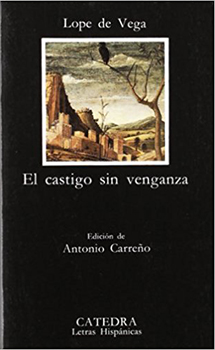Punishment without Vengeance
 Castigo sin venganza is a 1631 tragedy written by the Spanish playwright Lope de Vega at the age of 68, centred on adultery and a near-incestuous relationship between step-mother and step-son.
Castigo sin venganza is a 1631 tragedy written by the Spanish playwright Lope de Vega at the age of 68, centred on adultery and a near-incestuous relationship between step-mother and step-son.
Known for his adulterous and licentious lifestyle, the Duke of Ferrara is convinced to disinherit his illegitimate son and heir Count Federico and to marry in order to produce a legitimate heir. He sends Federico to meet his intended bride, Cassandra. Federico rescues her when her carriage gets stuck in a river ford and he falls in love with her. In the meantime, the Duke agrees to his niece Aurora that she may marry Federico to guarantee his position at court.
Federico tries to conceal his love and puts off the marriage to Aurora, so she encourages the advances of Gonzaga, who had accompanied Cassandra to the Ferrara court. Cassandra is also unhappy, since the Duke is still following his dissolute lifestyle. The Duke leaves to fight for the Pope, leaving Federico as regent in his absence. Federico and Cassandra admit to their love for one another and consummate it, but are unknowingly witnessed in a mirror by Aurora.
The Duke returns suddenly from the wars, now a reformed man. He receives an anonymous letter revealing the affair between his wife and son, but refuses to accept it until he seems them embracing. He decides he cannot punish them in public, since this will damage his honour, so he decides to cloak their punishment as a political murder. To achieve this, he ties up Cassandra in a room, gags her and wraps her in a blanket. He then tells Federico that he has discovered a nobleman plotting against him, who he has tied up and whom he wishes Federico to kill. Despite misgivings, Federico goes and does so, but the Duke calls in his courtiers, accuses Federico of deliberately killing Cassandra and has them kill Federico.
Summary
Justice Without Revenge, one of Vega Carpio’s last works, is an ironic tragedy based on a short novel written about a historical fact. In this drama, there are three protagonists: the womanizing duke of Ferrara, his illegitimate son, Count Federico, and the young noblewoman, Casandra, whom the duke marries for legal reasons. In the beginning of the play, Vega Carpio develops the relationship between the characters. In contrast to Peribáñez, in which the charming heroes win the approval of a just monarch, the protagonists of this drama do not represent upstanding citizens. Yet in spite of their antiheroics, the audience does, to some extent, sympathize with their decisions and actions. The duke regularly frequents the local whorehouses but knows that he has to marry and beget a legitimate heir for his estate. He has little interest, however, in remaining faithful to his young, attractive bride. Federico, his illegitimate son, whom the duke sincerely loves, is selfishly concerned about his hereditary position and has little patience for his father’s amorous adventures. Upon seeing his future stepmother, whom he rescues in a stagecoach accident, he falls instantly in love with her. Casandra reciprocates these feelings, although at the same time she accepts her commitment to her future husband, and the two lovers suffer the anguish of not being able to express their love openly.
Historical Note:
Federico's servant Batin closes the play with a comic line, noting that it was based on a true story in Italy - this refers to an event in 1425 under Nicolo III d'Este. De Vega also works in aspects of the story of King David as well as using the 208 novellas of Matteo Bandello (78 of these were translated into French by Boisteau and Belleforest and later into Spanish, in a first edition published in Salamanca in 1589). It may also allude to Philip II of Spain's marriage to his third wife Elisabeth of Valois in 1559 and problems with his first son Carlos, Prince of Asturias. In the view of the play's translator and editor Gwynne Edwards: "The relationship in the play between Casandra, the Duke's wife, and his son Federico was not unlike that between Prince Carlos, son of Philip II, and Isabel [Elisabeth] who became Philip's wife and Carlos's stepmother"; Edwards argues that these events were recent enough to have embarrassed the court of Philip IV and may have been a reason for the play's withdrawal after one performance.

